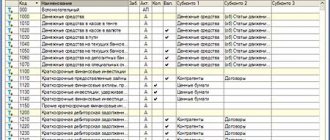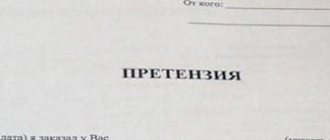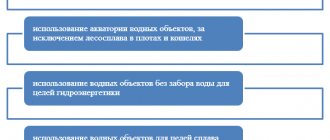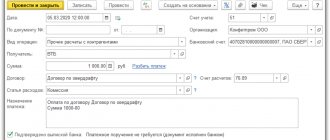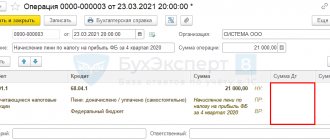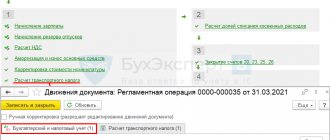Regardless of whether the agent acts on his own behalf or on behalf of the principal, he performs transactions at the expense of the principal. The agent does not own the ownership of the goods (work, service) being sold. A mandatory condition of any agency agreement is its remuneration, that is, the agent receives remuneration for his services.
Thus, no matter what agency transactions we are talking about, the agent always has income, expenses and objects of taxation only in relation to the amounts of the agent’s remuneration. Depending on whether the agency activity for the agent is permanent or one-time, it is possible to use both account 62 “Settlements with buyers and customers” (the principal for the agent is the customer of services) and account 76 “Settlements with various debtors and creditors." Given the variability, please note that the accounting treatment must be fixed in the accounting policy. If accounting is planned to be carried out using account 76, then the working chart of accounts must provide for appropriate levels of synthetic and analytical accounting.
Let's look at the wiring
Let's consider an example: an agent receives payment (remuneration) directly from the principal on the terms of 50 percent advance. The following entries are made in accounting:
Debit 51 Credit 62 (76)
— 1000 rubles – an advance on the agent’s fee was received;
Debit 62 (76) Credit 68.2
— 152.54 rubles – VAT is charged on the advance payment;
Debit 62 (76) Credit 90
— 2000 rubles – the agent’s income is recognized at the moment the principal accepts the agent’s report;
Debit 90 Credit 20
— 800 rubles – if there are direct expenses of the transaction agent, they are recognized in the cost price;
Debit 90 Credit 68.2
— 305.09 rubles – VAT is charged on the entire amount of the agent’s remuneration;
Debit 68.2 Credit 62 (76)
— 152.54 rubles – VAT accrued on the advance payment is accepted for deduction;
Debit 51 Credit 62 (76)
— 1000 rubles – the agent’s services are paid for by the principal.
In the absence of an advance payment, the agent's accounting is limited to entries 3, 4, 5 and 7 (for the entire amount of the remuneration). If the agent uses the simplified tax system, we exclude VAT transactions (2, 5 and 6).
Agency agreement: accounting entries
Let's imagine the main transactions for displaying operations in the table:
| Buh. recording | the name of the operation |
| At the principal's | |
| Dt 76 Kt 51 | Transfer of money necessary to perform operations |
| Dt 41 Kt 76 | The agent purchased the goods |
| Dt 41 Kt 76 | Accrual of agent remuneration (AB) |
| Dt 19 Kt 76 | Accepted for VAT accounting for AB |
| Dt 68 Kt 19 | VAT deductible |
| At the agent's | |
| Dt 51 Kt 76 | Funds received to fulfill the contract |
| Dt 60 Kt 51 | Transfer of money for goods to the supplier |
| Dt 002 | Arrival of products for the customer |
| Kt 002 | Transfer of purchased goods to the customer |
| Dt 76 Kt 90.1 | Remuneration accrual |
| Dt 90.3 Kt 68 | Calculation of value added tax on aircraft |
| Dt 68 Kt 76 | Acceptance of VAT deduction |
Withholding amounts
Now let’s consider the procedure for recording transactions when the agent withholds remuneration from the amounts received from the buyer of goods (services, works) of the principal:
Debit 62 (76) Credit 90
— 2000 rubles – the agent’s income is recognized at the moment the principal accepts the agent’s report;
Debit 90 Credit 20
— 800 rubles – if there are direct expenses of the transaction agent, they are recognized in the cost price;
Debit 90 Credit 68.2
— 305.08 rubles – VAT is charged on the entire amount of the agent’s remuneration;
Debit 76 Principal Credit 62 (76) Principal
— 2000 rubles – the agent’s remuneration is withheld from funds received from buyers to the principal.
Accordingly, if the agent uses the simplified tax system, then it is necessary to exclude the posting for VAT calculation.
Accounting
Documentation and correspondence of accounts for transactions between the agent and the principal take into account not only the terms of payment of agency fees in general, but also such nuances as:
- whether the agent works on his own behalf or on behalf of the customer;
- whether the agent receives remuneration from the amounts of goods sold to a third party (transfers from the value of contracts concluded by him) or whether the customer makes payment in a separate amount;
- whether the goods the agent is working with are stored in his warehouse or not, etc.
There may be several options for accounting schemes, the main ones are given below.
Transactions with the agent, if he acts on behalf of the customer
An agent working on behalf of a customer is not the owner of the goods and materials with which he works. Consequently, he has neither income nor expenses related directly to these values (PBU 9/99).
Postings:
- D51 (or 52) K76 - funds were received from the principal to secure the transaction, including VAT and remuneration.
- D76 K90.1 - agent remuneration.
- D90.3 K68.2 - VAT on the remuneration amount.
- D60 K51 - transferred to the supplier for goods and materials for the principal.
- D76 K60 - reimbursable agency expenses are recorded in accounting, including VAT.
Goods received for the customer are taken into account on the balance sheet, D002 (the goods are not the property of the agent). After the goods are shipped from the agent’s warehouse to the customer, they are written off from K002.
Transactions with the agent if he acts as an intermediary
- D62 K76 - revenue under the contract.
- D51 (or 52) K62 - the buyer made the payment.
- D76 K51 (or 52) - transfer of funds for goods and materials sold to the principal (minus remuneration amounts).
- D62 K90.1 - agent remuneration taken into account.
- D90.3 K68.2 - VAT has been accrued on the remuneration.
- D76 K62 - agent’s remuneration to be credited.
Similar to the previous option, off-balance sheet accounting of assets is maintained: D004 – capitalization of inventory items for sale, K004 – written off inventory items sold.
The principal's accounting is similar to that of settlements with suppliers, but one should take into account working with them through a third party - an agent.
Postings of the customer in case the agent acts on his behalf
- D76 K51 - transfer of money to the agent for purchases, remuneration, reimbursement of his expenses.
- D41 K76 - the purchase of goods through an agent is taken into account (a similar entry in the cost of goods takes into account the agency fee and delivery costs).
- D 19 K76 - VAT on the purchase of goods (a similar entry takes into account VAT on remuneration and delivery costs).
- D68.2 K19 - for VAT deduction.
Postings of the customer in case the agent acts as an intermediary
- D51 K62 - funds received from the agent, received by him from buyers.
- D62 K90.1 - revenue from the agent is recorded according to his report.
- D90.3 K68.2 - VAT on the proceeds.
- D20 (or 44, 26) K76 - the agent’s remuneration is fixed.
- D19 K76 - VAT on remuneration.
- D 68.2 K19 - for VAT deduction.
- D90.2 K20 (or 26, 44) - write-off of costs for agent services.
- D76 K62 - agent’s remuneration to be credited.
Agent's report
Thus, in an agent’s accounting, the main document on the basis of which income is reflected and the tax bases for VAT and income tax or simplified taxation system are formed is the agent’s report. The report is provided within the time limits established by the contract. The report is considered accepted by the principal if, within the period established in the contract, the latter has not received any objections to the data reflected in the document. Since the deadline for submitting the agent’s report is not established by law, and 30 days are allotted for the principal’s objections under the Civil Code of the Russian Federation, it is advisable to establish by agreement the frequency or deadline for the submission of agency reports, as well as a reasonable period for its consideration by the principal.
The form of such a report is not fixed by law, but it is subject to general requirements for mandatory details for primary accounting documents. To avoid disagreements at the stage of accepting the agent’s services, it is better to agree on the reporting form as an annex to the contract. According to existing business practices, the fact that the agent provides services is additionally documented in an act of provision of services, and this act can also be made part of the report. The condition for signing the act or its combination with the report must be fixed in the contract.
Agent revenue
The intermediary's income is remuneration. He takes it into account as income when calculating the income tax base. This is stated in Articles 156, 249 and subparagraph 9 of paragraph 1 of Article 251 of the Tax Code of the Russian Federation.
The contract may provide for remuneration as a percentage of the amount of goods sold, either in a fixed amount, or in the form of the difference between the price set by the principal and the selling price (more favorable price) at which the transaction was ultimately completed, or in some other way.
The agreement may provide for two settlement options:
- with the participation of an intermediary in settlements;
- without the participation of an intermediary in settlements.
If the commission agent participates in settlements, the proceeds from the sale of goods go to the intermediary's current account or cash desk, and he transfers this money to the owner of the goods (committent).
If the intermediary does not participate in the settlements, the proceeds from the sale of goods by the commission agent go to the current account or to the cash desk of their owner (committent). After this, the principal transfers the remuneration due to him to the intermediary.
But in any calculation option, only the amount of his remuneration is considered the intermediary’s revenue. Money received from the buyer of goods is not included in the income of the intermediary (Clause 1, Article 251 of the Tax Code of the Russian Federation).
The intermediary must reflect the revenue in tax accounting after it has fulfilled its obligations under the contract (that is, after the actual provision of services). Under the accrual method, they are considered completed on the day when the parties signed the relevant act or when the principal approved the agent’s report.
Please note that this must be clearly stated in the contract.
With the cash method, the intermediary must reflect the revenue in tax accounting after he receives his remuneration (the money goes to the current account or to the cash desk, an offset of mutual claims will be issued, etc.).
When determining the tax base for income tax, the following are not included in the income of the commission agent (subclause 9, clause 1, article 251 of the Tax Code of the Russian Federation):
- funds received by the commission agent from buyers in favor of the principal;
- funds received by the commission agent from the principal to reimburse the costs incurred by him in connection with the execution of the commission agreement.
Principal's counterparties
The terms of the contract may provide for the participation of an agent in settlements between the principal and buyers or suppliers. The cash flow in this case does not generate income or expenses for the agent, but transits through account 76 “Settlements with various debtors and creditors.” In addition, the principal’s assets may be transferred to him for subsequent sale to the buyer, or the agent may accept from suppliers assets purchased on behalf of the principal. In this case, ownership of the assets does not pass to the agent, and if there are documents on the transfer of assets to him (acts, TTN, etc.), he reflects the assets in off-balance sheet accounts 004 “Goods accepted for commission” or 002 “Inventory accepted for commission” for safekeeping."
Agent Summary
The agent organizes and establishes in the accounting policy the procedure for reflecting transactions and analytics for accounting for agency fees, settlements with the principal and his counterparties, and document flow for these transactions.
VAT for payment to the budget is calculated by the agent (if he does not use the simplified tax system) only on the amounts of the corresponding remuneration. To calculate income tax (tax under simplified taxation system), the agent takes into account only the agency fee in income, and his current expenses in expenses. In addition, all settlements in the interests of the principal are carried out in the agent’s accounting through account 76, without participating in the calculation of income, expenses and tax bases. And the assets of the principal transferred to the agent do not become his property; in accounting they are reflected in an off-balance sheet account.
The accounting records of the principal reflect separately transactions on agent remuneration and separately transactions on the purchase and sale of assets in which the agent is involved.
note
30 days are allotted to receive the principal’s objections in accordance with the Civil Code of the Russian Federation.
Documentation of such transactions depends on the type of agency contract, but according to the general principle, if an agent acts on his own behalf, then all primary documents and invoices for the main transaction are issued in his name, and he also transfers their certified copies to the principal for the latter to reflect transactions in your account. If the company acts on behalf of the principal, then the final documents are also drawn up on his behalf (in the person of an agent by proxy) and their originals serve as the basis for recording transactions in accounting.
Also, if the agency agreement provides, in addition to remuneration, compensation for the agent’s expenses incurred in the interests of the principal, copies of documents confirming expenses, including invoices, are attached to the corresponding report. Based on it and copies, expenses are reflected in the principal’s accounts.
Reimbursable amounts
The financiers in the commented letter noted that the tax accounting of income and expenses of the agent organization is predetermined by the terms of the concluded agency agreement.
Thus, the parties may agree that the intermediary enters into transactions with third parties directly related to the sale of consignment goods. This may include transportation, insurance of the goods, advertising, etc. These costs are borne by the owner of the goods. They are included in the principal's costs as related to the sale of goods (products) and are subject to reimbursement by the principal.
The contract may also provide for reimbursement by the principal of storage costs. This:
- goods warehousing services;
- warehouse rental and operational services for warehouse rental;
- services for the protection of the principal's property.
If information and consulting services, as well as travel expenses for employees of the agent company, are directly related to the execution of orders under the agency agreement, then they will also be subject to reimbursement by the principal on the basis of the report submitted by the commission agent and documents attached to it confirming the expenses incurred.
All expenses of the commission agent directly related to the execution of the commission agreement (expenses incurred in favor of the principal) are not reflected as part of the commission agent's expenses, but are taken into account by him in the settlement accounts and are subject to reimbursement by the principal in accordance with the terms of the agreement (clause 3 of PBU 10/99 ).
Thus, in order to avoid disputes with both the tax authorities and among themselves, the parties to the agreement must clearly establish what expenses the principal reimburses the commission agent.
And the intermediary’s report must contain information about the amount of actual costs incurred that are subject to reimbursement. He must attach primary documents confirming expenses to the report.
Features of accounting for the principal
Let's consider the transactions when the agent sold the principal's non-residential real estate:
Debit 26, 91 Credit 60
— 1000 rubles – based on the agent’s response, the expenses for the agent’s remuneration are reflected;
Debit 19 Credit 60
— 180 rubles – based on the report and invoice, VAT on agency fees is reflected;
Debit 26, 91 Credit 60
— 300 rubles – based on the copies of documents attached to the agent’s report, notary expenses, fees, and appraiser services are reflected;
Debit 19 Credit 60
— 36 rubles – based on the attached report, a copy of the invoice from the appraisal organization reflects VAT on appraisal services;
Debit 68.2 Credit 19
— 216 rubles (180 + 36) – VAT is accepted for deduction;
Debit 60 Credit 51
— 1516 rubles – the agent was paid a fee and compensated for additional expenses;
Debit 62 Credit 90
— 11,800 rubles – at the time of transfer of ownership rights, proceeds from the sale of property are recognized;
Debit 90 Credit 68.2
— 1800 rubles – VAT accrued on the sale of property;
Debit 90 Credit 41 (01)
— 6,500 rubles – the cost of sold property is written off.
Thus, the principal has the following formed on OSNO:
- costs for calculating income tax on the services of an agent and compensation for his expenses;
- “input” VAT;
- tax base for VAT in terms of proceeds from the sale of property;
- tax base for income tax as the difference between income and expenses from the operation of selling property.
note
The agent organizes and establishes in the accounting policy the procedure for reflecting transactions and analytics for accounting for agency fees, settlements with the principal and his counterparties, and document flow for these transactions.
With the simplified tax system, accounting will be somewhat simpler. First, we generate income and expenses without charging VAT and including “input” VAT in expenses, or generally take into account only income from the disposal of property if we use only income as the tax base under the simplified tax system.
"Blind spots" of the agency agreement
From this point of view, the ruling of the Thirteenth Arbitration Court of St. Petersburg dated February 11, 2008 in case No. A56-19595/2007 is interesting.
The crux of the matter: according to Interdistrict Tax Inspectorate No. 5 for St. Petersburg, the funds collected from residents under agreements for shared participation in the costs of maintenance and upkeep of the home, concluded with Orgtekhremstroy LLC, were not reflected as received revenue or from the company, nor from CJSC "TsUN", working with the LLC under a subagency agreement. Such conclusions of the tax authorities are based on the testimony of 148 witnesses that the HOA was not created, and on the recognition of agency agreements as agreements for the resale of utility services provided by the relevant supply organizations.
The total amount of tax claims amounted to more than 6.5 million rubles.
The arbitrators, when considering the case materials, came to conclusions.
The basis for the emergence of an object of taxation for taxpayers both for VAT and income tax is the execution of transactions for the sale of goods (works, services). Between the LLC and the owners of apartments located in houses managed by the HOA, agreements were concluded for shared participation in the costs of maintenance and upkeep of the property, which regulated the procedure for making payments by individuals for utilities, as well as the procedure for the provision and payment of services for the maintenance of premises . As can be seen from the case materials, under the above-mentioned agreements the Company acted as an agent in relation to utility services provided by specialized organizations and their payment, as well as a contractor in relation to services for technical and sanitary maintenance of HOA premises. In the process of fulfilling its obligations under the agreements, the Company delegated its duties as an agent for accrual, collection and accounting of funds for payment of utilities to the subagent - CJSC "TsUN". Individuals transferred funds to the accounts of CJSC TsUN. Agreements with homeowners do not indicate that any services are provided to the LLC personally, but set out the procedure for making utility payments by homeowners. For all incoming funds, the LLC, in accordance with the provisions of Article 1008 of the Civil Code of the Russian Federation, reported to the relevant HOAs in the agent’s reports, which are available in the case materials. These reports were compiled based on data received from the subagent.
In the appeal, the tax inspectorate wrongfully points out that the homeowners - individuals did not create an HOA and did not give any instructions to the LLC. Meanwhile, several thousand homeowners live in houses managed by the HOA, in which the LLC organized the collection of funds, while in accordance with the audit report, the tax authority interviewed 148 individuals. Moreover, according to Article 48 of the Federal Law of June 15, 1996 No. 72-FZ “On Homeowners’ Associations,” which was in force during the period under review, an HOA in a newly created condominium can be formed by the customer, developer or other individual or legal entity, including authorities state power and local government, or a group of persons who act jointly and have or will have ownership rights to the newly created property. Consequently, HOAs could be created without the participation of individual homeowners. Moreover, the fact that they were unaware of its creation does not mean that the corresponding HOAs did not exist and did not manage the houses.
Participation in settlements
Let's consider another example when the agent sells the principal's goods and at the same time participates in the settlements.
Debit 45 Credit 41
— 20,000 rubles – goods are transferred to the agent for sale (act or TORG-12);
Debit 44 Credit 60
— 1000 rubles – based on the agent’s report, remuneration expenses are reflected;
Debit 19 Credit 60
— 180 rubles – based on the report and invoice, VAT on agency fees is reflected;
Debit 90 Credit 45
- 10,000 rubles - according to the report and copies of documents for the sale of goods, the cost of products sold is reflected;
Debit 62 Credit 90
— 17,700 rubles – based on the report and copies, sales revenue is reflected;
Debit 90 Credit 68.2
— 2700 rubles – VAT is charged on the sale of goods;
Debit 60 Credit 51
— 1180 rubles – the agent has been paid a fee;
Debit 51 Credit 62
— 17,700 rubles – funds received from the agent for goods sold.
